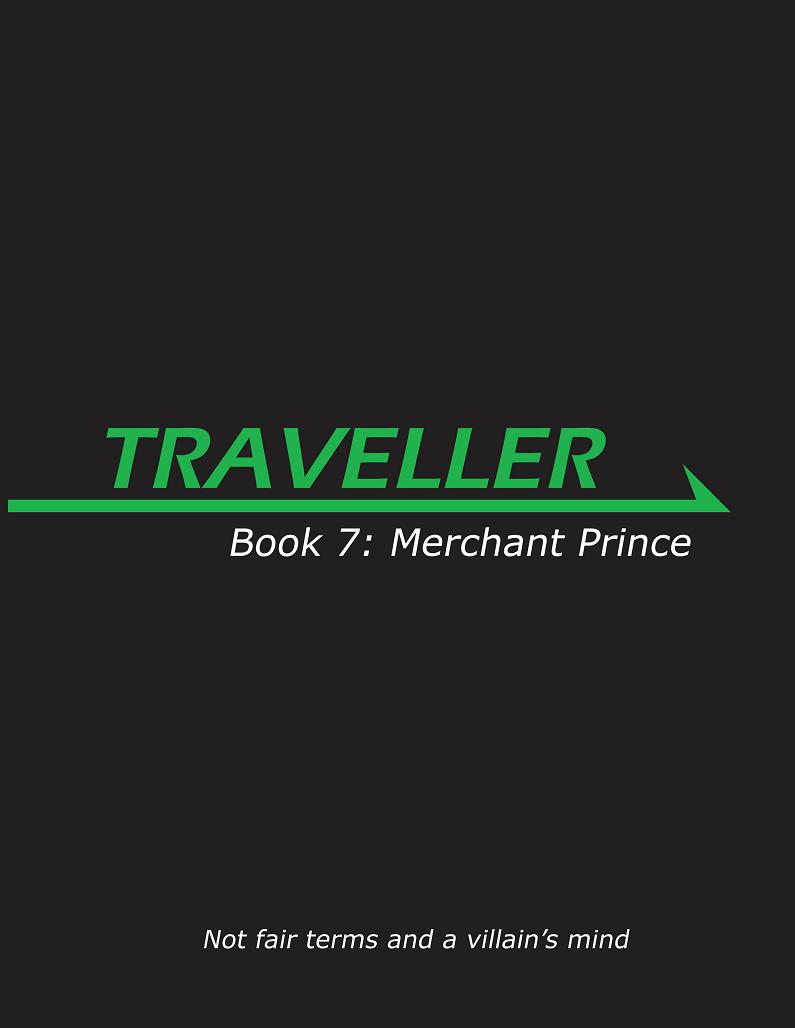This article originally appeared in issue #008 of the downloadable PDF magazine.
 Mongoose
Traveller: Book 7: Merchant Prince. Bryan Steel
Mongoose
Traveller: Book 7: Merchant Prince. Bryan Steel
Mongoose Publishing http://www.mongoosepublishing.com
124pp, softcover
US$24.99/UKú15.00
Mongoose Traveller recaps another Classic Traveller career book, expanding on the Merchant career to good effect
On the Shelf
As with the other Mongoose Traveller career books, the black-with-green-arrow motif identifies the book immediately. The tagline is “Not fair terms and a villain’s mind”.
Initial Impression
As might be expected, this volume is focused on trade and traders, looking in turn at generating individual merchant characters in any of 21 career paths, generating and managing trading companies, engaging in trade at the individual ship level, and privateering. Also included are profiles of trading organizations, a list of trade goods, and capsule summaries of technology useful to merchants. As with other recent Mongoose career books, the text is clear and easy to read, and the artwork does not interfere with it.
On Closer Inspection
Seven general career paths are offered, with three specializations each. These run the gamut from the desk-bound Broker to the hands-on jobs of the Marketer, Merchant Marine, Free Trader, Junk Dealer, and Slaver, and extending to the rarefied heights of the Royal Trader. Several of the specializations appear to overlap somewhat in description, but represent doing those similar jobs in quite different contexts.
In addition to those career tables, the character generation section offers three new character traits: the Buyer/Seller, a new type of Ally; Influence, representing how much other listen to your merchant character; and Bankruptcy, which offers an alternative to mustering out with a major debt load.
The section on Commercial Entities, “Commercial Success in Ten Steps”, provides rules for in essence treating a company as a character, and “playing” the character (in a company-appropriate context – trading, investing, and managing at the corporation level instead of the “tramp trader” level) in a “game-within-a-game”. To a large extent, this is “Accurate Adventures in Accounting” – but there’s no reason, other than personal taste, to discount it as part of a campaign. After all, the player-characters need to be able to do something with the wealth they accumulate, and it just doesn’t seem satisfactory, somehow, to simply declare that they purchase a habitable moon in the Utopia system and retire there to a life of leisure…
The section on trade (at the “tramp trader” level) expands on the trading rules in the Traveller core rules, in much the same way that the Mongoose Traveller core rules for trade expanded on the Classic Traveller rules for trade: Categories of goods are broken down into several sub-categories, each with its own price (instead of one-price-fits-all), and additional DMs are offered for various skills and tasks. Merchant Prince also expands on the types of trading, by adding ‘Junk Dealing’ and ‘Slaving’ to the old standbys of Freight Carriage, Passenger Carriage, and Speculative Trade.
For those players who have a taste for both the mercantile and mercenary life, a section on privateering discusses what’s involved in satisfying both tastes at once. The difference between privateering and piracy is discussed in brief; the distinction between types of privateers (based on the type of organization backing the privateer), including expectations, obligations, benefits, and dangers, is discussed in depth.
The section on Trade Goods provides basic information on a wide variety of classes of goods, both broadly specified (e.g., Basic Raw Materials) and more closely specified (e.g., Workable Alloys) including a basic price (modified by DMs during the trading process outlined in the trade rules section), availability modifiers, lot sizes, and additional modifiers for origin and destination world trade codes, and for dangerous goods. Trade goods so specified include both legal and illegal goods, and there is even a section for defining “exotics” and one-offs.
Finally, the section on merchant technology supplements the Central Supply Catalogue with devices and mods that will clearly be helpful to merchants (and may be useful to others as well). A small selection of “tramp trader”-sized ship are also specced out, with the usual one-page deck plans – and the usual comment about how it would be better to compile and release these deck plans in 25/28mm scale, so that they can be used with miniatures. These ships, at least, are small enough that detail neither is lost nor requires a magnifier or squinting.
Summary
This volume is a must-have for anyone interested in trade-focussed campaigns. While there are those who deride trade-based campaigns as “Accurate Adventures in Accounting”, one cannot deny that trade can form the basis of any number of adventures with as much tension, risk, and reward as any mercenary ticket – if nothing else, as a privateer. This book is aimed at those who are interested in such mercantile adventures, and it provides well for them.
 Freelance
Traveller
Freelance
Traveller